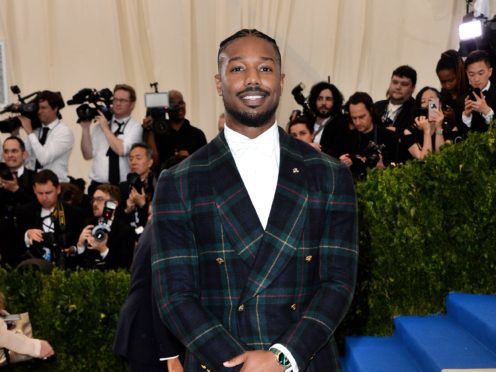Michael B Jordan has pledged to adopt inclusion riders at his production company in order to combat inequality in Hollywood.
The Black Panther star made his comment days after Frances McDormand popularised the concept of an inclusion rider – a clause that can be written into a star’s contract that demands racial and gender diversity in front of and behind the camera – in her emotive acceptance speech at the Academy Awards.
Jordan wrote in an Instagram post: “In support of the women & men who are leading this fight, I will be adopting the Inclusion Rider for all projects produced by my company Outlier Society.
“I’ve been privileged to work with powerful woman & persons of color throughout my career & it’s Outlier’s mission to continue to create for talented individuals going forward.”
He added a hashtag supporting the Annenberg Inclusion Initiative, which created the movement.
At the Oscars, best actress winner McDormand called on all the female winners and nominees to stand with her as she claimed the prize for her role in Three Billboards Outside Ebbing, Missouri.
To rapturous applause, she added: “I have two words to leave you with tonight ladies and gentlemen: inclusion rider.”
The phrase inclusion rider was coined by Dr Stacy Smith, from the Annenberg Inclusion Initiative of Californian university USC Annenberg, in a 2016 TED talk she gave titled The Data Behind Hollywood’s Sexism.
Between 2007 and 2015, Dr Smith said she analysed more than 800 films and catalogued every speaking character by their gender, race, ethnicity, sexual orientation and disabilities.
Fewer than a third of all speaking roles are given to girls or women, she said, despite women making up half of the population and, when it came to other demographics, there was an even higher imbalance.
Thanks for leading and using your voice @michaelb4jordan! #InclusionRider https://t.co/AeODTg1tjz
— Annenberg Inclusion Initiative (@Inclusionists) March 7, 2018
“Across the top 100 films of just last year, 48 films didn’t feature one black or African-American speaking character, not one,” she said.
“Seventy films were devoid of Asian or Asian-American speaking characters that were girls or women.”
The lack of representation among women and minorities amounted to “erasure”, she added, in which women are overly sexualised.
So she suggested a number of solutions to address the imbalance, including for the most in-demand female stars of the day to demand the realistic representation of women and minorities in their contracts.
“A-listers, as we all know, can make demands in their contracts, particularly the ones that work on the biggest Hollywood films. What if those A-listers simply added an equity clause or an inclusion rider into their contract?”
For those of you asking about the #InclusionRider, it's designed to ensure equitable hiring in supportive roles for women, POC, the LGBT community, & people w/disabilities. #DrStacySmith worked with @KalpanaKotagal to craft the language. Contact us to learn more.
— Annenberg Inclusion Initiative (@Inclusionists) March 5, 2018
If you’re wondering what and where “Inclusion Rider” came from, we can tell you. It came from #DrStacySmith and you can learn more here (start at minute 11): https://t.co/SEgm8prEsJ
— Annenberg Inclusion Initiative (@Inclusionists) March 5, 2018
The aim is to give a realistic representation of the world by offering out speaking roles to characters in order to reflect the region where the film was set.
“We actually have the ability to change the world on this one,” Dr Smith said.
“The US and its content, films in particular, have captured the imaginations of audiences worldwide.
“So that means that the film industry has unprecedented access to be able to distribute stories about equality all around the world.”
